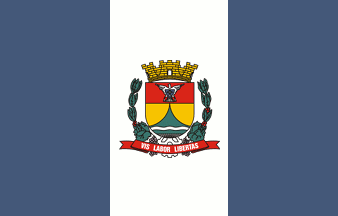 image by Dirk Schönberger,
20 November 2012
image by Dirk Schönberger,
20 November 2012Source: http://www.itatiba.sp.gov.br/samba/Sobre-Itatiba/bandeira.html

Last modified: 2012-12-15 by ian macdonald
Keywords: sao paulo | itatiba |
Links: FOTW homepage |
search |
disclaimer and copyright |
write us |
mirrors
 image by Dirk Schönberger,
20 November 2012
image by Dirk Schönberger,
20 November 2012
Source:
http://www.itatiba.sp.gov.br/samba/Sobre-Itatiba/bandeira.html
A blue-white-blue vertical triband, bearing the municipal arms in the centre.
Official website at
http://www.itatiba.sp.gov.br
Dirk Schönberger,
20 November 2012
Itatiba emerged as Bairro do Atibaia, a borough established in 1786 near river Atibaia by pioneers coming from Bragança and Atibaia. In 1792, the borough counted 42 families, that is more than twice the original number. The same year, Sergeant Antonio Rodrigues da Silva, who served in the 6th Company of the 1st Infantry Regiment and in the Jundiaí militia, settled on the borough; he built on the site of today's Cruzeiro borough a chapel dedicated to Our Lady of Bethlehem, a cult originating from Minas Gerais. Following the increase of the population, mostly coming from Jundiaí, Rodrigues and his friend Raimundo Cardoso de Oliveira acquired in 1822 a piece of land uphill where they would establish a new settlement, whose plan was registered in August 1823. The parish of Belém de Jundiaí was established on 9 December 1830. The municipality of Belém de Jundiai, seceding from Jundiaí, was established on 20 February 1857 by Law No. 553 and inaugurated on 1 November 1857. The name of the municipality was changed in 1877 to Itatiba (in Tupi-Guarani, "several stones").
Itatiba was in the second half of the 19th century part of the coffee western pioneer's front. The town was so wealthy that it owned its railways company, "Estrada de Ferro Carril Itatibense". Following different crises that culminated in 1929, Itatiba morphed into an industrial town, with the set up of textile, phosphor and shoe factories. In the 1960s, Itatiba became a center of movie production, specialized in "colonial movies".
The anthem, flag and coat of arms of Itatiba are listed as the municipal symbols, without further description, in Article 2 of the Municipal Constitution.
http://www.itatiba.sp.gov.br/samba/Lei-Organica/lei-organica.html - Municipal constitution
The flag is vertically divided blue-white-blue with the municipal coat of arms in the middle.
Photo of the flag http://guardamunicipalcuritiba.blogspot.fr/2012/08/tribunal-acata-pedidos-do-mpt-e-proibe.html [This confirms the odd shade of blue on Dirk's image.]
The coat of arms is prescribed by Municipal Law No. 169 of 9 December 1956. "Or grafted in base vert a river wavy argent and stones of the same in base, a chief gules an eagle argent with broken chains at his feet holding an escutcheon azure charged with a fleur-de-lis argent. The shield surmounted by a three-towered mural crown or. The shield supported by two branches of coffee fructed interlaced with grapevine leaves and fruit in base all proper, in base a cogwheel or [argent on the drawing]. Below the shield and over the cogwheel a scroll gules inscribed with the motto 'VIS LABOR LIBERTAS' argent."
Coffee and grapes are the main crop in the municipality. The stones recall that the name of the town comes from the Tupi words "ita", "a stone", and "tiba", "several". The field or highlights the wealth of the municipality. The chief gules represents the struggle for the abolishment of slavery, also recalled by the eagle's broken chains. The eagle represents the power of the Blessed Virgin, the patron saint of the town. The mural crown is a symbol of the municipalities. The grafted base vert represents the uphill, geographical location of the town. The fess wavy represents river Jacaré that waters the town. The cogwheel highlights the industrial potential of the municipality. The town's motto means "Strength, Work, Liberty".
http://www.itatiba.sp.gov.br/samba/Sobre-Itatiba/brasao.html -
Municipal website
Ivan Sache, 24 November 2012